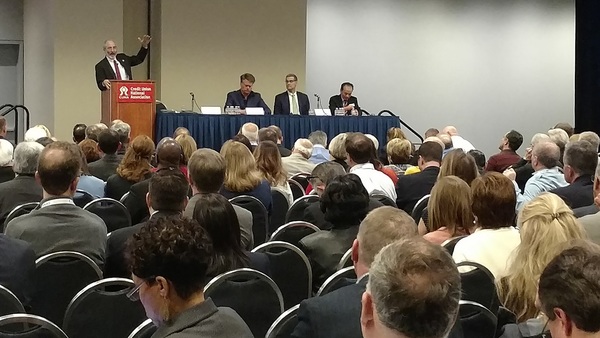 From left to right: Bill Hampel, chief economist and chief policy officer for CUNA, Steve Rick, chief economist for CUNA Mutual Group, Mike Schenk, vice president, economics and statistics at CUNA and Perc Pineda, CUNA’s senior economist.
From left to right: Bill Hampel, chief economist and chief policy officer for CUNA, Steve Rick, chief economist for CUNA Mutual Group, Mike Schenk, vice president, economics and statistics at CUNA and Perc Pineda, CUNA’s senior economist.WASHINGTON – Despite the expected rise in interest rates and inflation, credit union economists project strong growth for credit unions, including a fourth year in a row of double digit loan increases.
Perc Pineda, CUNA’s senior economist, said the U.S. economy is expected to continue to grow moderately, labor markets will continue to improve and there will be an acceleration of inflation, which all have implications for credit unions.
But the bottom-line implication will mean strong loan growth for credit unions this year.
For example, credit unions posted across-the-board loan growth of 10.7% in 2016 and that loan growth is expected to continue this year at about 10%, the fourth consecutive year in loan growth, according to Mike Schenk, vice president of economics and statistics for CUNA.
“You have to go back 30 years to see three consecutive years of double digit growth in loans,” Schenk said during a standing room only GAC breakout session Monday called Economic Outlook and Credit Unions.
Although credit unions with small assets are growing their loan portfolios more slowly than their larger counterparts, the growth that the industry is seeing across the board represents an acceleration of what occurred last year, he added.
“The backdrop of this is that we are seeing especially large market share gains, again, almost across the board,” Schenk said. “For instance, we almost tripled our share of mortgage originations since 2007. If you look at, for example, credit card growth, every year since 2007 credit union credit card growth has surpassed what we see in the banking sector by a wide margin. The same can be said for automobile loans, the same can be said for business loans for small businesses.”
Although there is a general perception that consumers will stop borrowing when interest rates increase, Schenk said, in the past when the fed begins to raise interest rates, consumers who were standing on the sidelines will take out loans before the fed increases the interest rates even more.
Schenk also said that there is a “tremendous amount” of pent up consumer demand for loans.
He also believes that credit union earnings will continue at a fairly high rate, in part, because of strong employment growth and credit union employee turnover.


